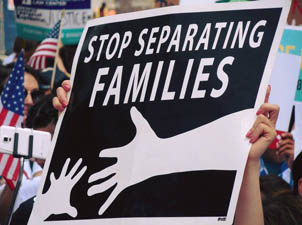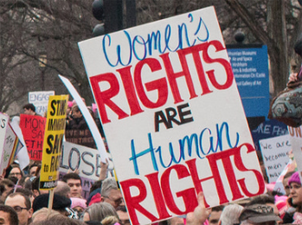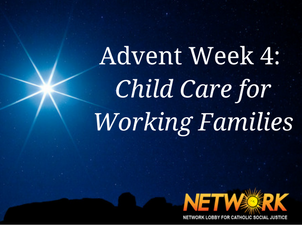
Live Updates on Congressional DACA Debate
Updates are listed in reverse chronological order from the top of the page
Tuesday, February 20, 2018
Members are out for recess this week after an intense immigration debate that ended with the failure of four immigration bills. Although there is much bad news to go around about DACA, the one silver lining of last week’s votes was the overwhelming number of votes against the Administration’s immigration bill led by Senator Grassley: “The Secure and Succeed Act of 2018.” The Senate made clear that although it was fractured on the issue of what a DACA fix should look like, there is unity on what it should not look like (See: NETWORK and partners ask Congress to vote against Senator Grassley’s immigration bill.) On the House side, Republican leadership attempted to whip votes for a similar anti-immigrant bill and determined that they did not have enough votes to pass.
Now, we must raise immigration from the ashes of last week’s debacle and find an immediate solution for DACA, 13 days from its cessation. We cannot allow Congress to drop this issue. Remember that after March 5, about 1,400 DACA recipients will lose their status every day. We are using this recess to gather information and plan next steps for action and we are grateful that many NETWORK advocates are meeting in district with key members of Congress arguing them to pass bipartisan DACA legislation when they return to work next week, February 26. We are keeping our eye on the process for a solution going forward and will update this space as we learn more and continue advocating for a solution.
Thursday, February 15, 2018, 6:00 pm
The Senate has voted, and all four amendments have failed. Read Sister Simone’s response.
Thursday, February 15, 2018
Majority Leader Mitch McConnell has filed for motion to cloture vote on four amendments and we could see a vote on the amendments individually sometime between today and Friday evening. Once an amendment reaches 60 votes it is attached to the final bill. The four amendments will be voted on in the order they have been filed. Below, please find NETWORK’s vote recommendations on those amendments for the Senate.
- NETWORK strongly supports the “Uniting and Securing America Act” Senate Amendment #1955 led by Senator Coons (DE) and Senator McCain (AZ). The USA Act is a strong bipartisan bill which provides Dreamers with a pathway to citizenship and authorizes funding for data-driven border technology in consultation with border communities. This bill upholds the human dignity of those affected by DACA with a narrow bipartisan, bicameral solution.
- NETWORK strongly opposes “Stop Dangerous Sanctuary Cities Act” Senate Amendment #1948 led by Senator Patrick Toomey (PA). This bill threatens to break the trust between local law enforcement and immigrant communities and will make our communities less safe. This bill fails our test of upholding human dignity. NETWORK asks Senators to vote NO on this bill and urges Members to support a narrow, bipartisan solution for Dreamers with a pathway to citizenship.
- NETWORK strongly opposes “Secure and Succeed Act of 2018 (S. 2192),” Senate Amendment #1959 led by Senator Charles Grassley (IA). This bill would permanently ban families from reuniting in the United States. Families belong together and this bill violates the sanctity of family. NETWORK asks Senators to vote NO on this bill and urges Members support a narrow, bipartisan solution for Dreamers with a pathway to citizenship.
- NETWORK does not take a position on the “Rounds-King” proposal, Senate Amendment #1958. We are grateful that this amendment provides Dreamers with a pathway to citizenship. We are, however, deeply concerned about the impact this bill will have on domestic immigration enforcement, wasteful spending at the border, and concerned that it removes discretion for considering the situations of families as well as limiting family reunification. We are a nation that values families and that should be recognized in our law.
We must recognize that passing a solution for our country’s immigrant youth is paramount. Since September 5, Dreamers and their families have lived in fear of deportation and Congress delayed a solution until the last minute, wherein thousands of Dreamers have already lost their DACA protections. This is the place we are in with a Republican-controlled Congress and a Republican-controlled Administration which has refused to let us pass a clean Dream Act to protect Dreamers. After March 5th, 1,400 DACA recipients will lose their status every day. This amendment raises some serious concerns for us and our immigrant communities but it is our last chance to pass a solution for DACA recipients. As people of faith, we cannot sit back and watch our immigrant youth be ripped away from their homes.
Wednesday, February 14, 2018
The immigration debate continues in the Senate today and amendments are expected to hit the floor as members hurry to draft language from bipartisan negotiations with a possible vote in the next couple of hours. Fourteen amendments have been filed to date. Most of them our Republican messaging bills aimed at making Democrats who are up in 2018 take tough votes on immigration hot button issues. One of the amendments filed is the Secure and Succeed Act of 2018 sponsored by Senators Grassley (R-IA and Cornyn (R-TX) which contain the provisions President Trump has laid out for any DACA deal. NETWORK and our partners sent a letter to Senators this morning urging them to vote NO on this bill which includes the Administration’s four immigration pillars. Read the letter here.
Thus far, there is only one bipartisan bill sponsored by Senators McCains (R-AZ) and Coons (D-DE) – which is a narrow bill providing a pathway to citizenship with minimal border security. There are also two other bipartisan efforts aimed at finding a compromise that garners the 60 votes needed to get a bill voted out of the chamber. Democratic leaders and Republican moderates are currently meeting with the goal of finalizing a deal by the end of the day.
We are monitoring the floor closely today for narrow bipartisan amendments which include a pathway to citizenship for Dreamers and continue to urge members to vote NO on bills which are harmful to our immigrant communities.
Tuesday, February 13, 2018
As floor debate continues into today, Senate leadership will negotiate terms of amendment proposals and we will begin seeing amendments after the terms are set. As negotiations continue, we expect significant amendment action tomorrow.
The Congressional Black Caucus weighed in the immigration debate yesterday urging a no vote for any Republican plan that cuts family and diversity visa programs. They further argued that the Administration is pitting black and brown immigrants against each other by offering a pathway to citizenship for Dreamers in exchange for tearing families of color apart.
We continue to see members of the Senate float “compromise” proposals to try to get to 60 votes. They range from bills that have a pathway to citizenship for dreamers with limited border security to broad proposals that provide a pathway to citizenship paired with the Administration’s four immigration pillars, allocating $25 billion for a border wall, increase to interior enforcement and cuts to family based visas.
NETWORK urges Congress to pass a narrow bipartisan bill which upholds human dignity, family unity and provides Dreamers with a pathway to citizenship.
Monday, February 12, 2018
With less than a month to go until the end of DACA, Congress is heading into a week of debate on immigration to find a solution for DACA recipients. Early last week, in an effort to avert another government shutdown, Senator Mitch McConnell and Senator Chuck Schumer came to an agreement on a two-year budget deal which advocates hoped would be paired with a DACA solution. As part of a budget deal, Senator McConnell asked to have DACA decoupled from the budget in exchange for a promise to create a fair process of debate for a DACA fix immediately following the passing of a budget. The strategy was agreed to by Democrats and the budget bill was passed with wide bipartisan support. Today as promised, Senator McConnell will begin the immigration debate which is expected to go through the week. The process will allow Republicans and Democrats to bring forth a number of immigration amendments to the floor for votes. The goal of the process is to pass a bill that gets at least 60 votes.
There are different perspectives of what should be in the bill. Anti-immigrant hardliners – including the Trump Administration – want to pair a DACA fix with major reforms to the immigration system that limits family visas, substantially increases border and interior enforcement and limits protections for unaccompanied asylum seekers. Moderate Republicans and Democrats are seeking a more limited bill that provides a pathway to citizenship for Dreamers and includes more limited border enforcement funding. This weekend, hardline Senate Republicans introduced a proposal that contains priorities of the Trump Administration. It will likely be put on the floor this week as one option, although it will not have the votes necessary for passage. Democrats have signaled they will bring the Dream Act forward with the possibility of some border measures to get 60 votes as one of several options to get to 60 votes. Negotiations are underway at the Member level.
All eyes are on the Senate this week for the immigration amendment process…Things are moving quickly – Stay tuned, we will be updating this page as the amendment process proceeds. Senators need to hear from us now more than ever on the issue of DACA and the importance of a narrow solution for Dreamers which is includes a pathway to citizenship.

















